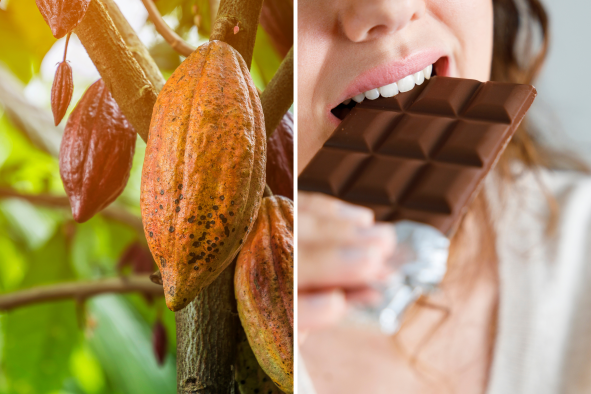Your favorite green latte might help keep your mouth healthy, researchers have found.
Matcha—a finely ground green Chinese tea often mixed with milk or used in sweets—may keep periodontitis, severe gum disease, at bay, according to a new paper in the journal Microbiology Spectrum.
A leading cause of periodontitis is the bacteria Porphyromonas gingivalis, which the researchers have discovered is inhibited by matcha.
"Matcha may have clinical applicability for prevention and treatment of periodontitis," the researchers wrote in the paper.
They found that the growth of P. gingivalis was inhibited by the presence of matcha in lab experiments. They tested matcha solution against 16 species of oral bacteria, and found that after two hours of exposure, nearly all P. gingivalis cells had been killed, and all were dead by four hours.
The scientists then went on to test the effects of matcha mouthwash on 45 people with periodontitis, finding that those who used the mouthwash had significantly lower levels of P. gingivalis in their saliva compared to those who didn't.
Periodontitis is a severe gum infection that damages the soft tissue and, if untreated, can lead to tooth loss or even destroy the bone that supports your teeth. Plaque forms on the teeth due to bacteria in the mouth feeding on sugars in food, which can then harden under your gumline into tartar if not removed. P. gingivalis is one of the main bacterial species involved in this process.
"The natural habitat for Porphyromonas gingivalis is below the gumline in humans. It is typically detected at very low level, if at all, during health; but under certain conditions it can become destructive and transform a healthy subgingival microbiome into a pathogenic community. This results in chronic infection and inflammation and if left untreated, tooth loss," Mary Ellen Davey, a senior researcher at the ADA Forsyth Institute, told Newsweek.
The longer plaque and tartar remain on your teeth, the more they irritate the gingiva, the part of your gum around the base of your teeth. This irritation can cause inflammation of the gums, which may eventually lead to periodontitis, eventually causing pockets to develop between gums and teeth that fill with plaque, tartar and bacteria.
"The dangers of periodontitis has been at the focus of much attention in dental and medical research, because this multifactorial inflammatory disease of the oral cavity is not only a major cause of tooth loss, but also is associated with a wide range of other chronic inflammation-driven disorders, including diabetes mellitus, preterm birth, cardiovascular disease, aspiration pneumonia, rheumatoid arthritis, cognitive disorder and cancer," study author Ryoma Nakao, a researcher at the Japanese National Institute of Infectious Diseases (NIID), told Newsweek.
Matcha tea is made using the leaves of Camellia sinensis, a green tea plant that has long been associated with antimicrobial effects. Previous research has found that green tea in general can inhibit the growth of other dangerous bacteria like E. coli, and that P. gingivalis is less able to adhere to cells inside the mouth after exposure to green tea extract.
"The study showed that matcha extract inhibited the growth with morphological and physiological changes at the bacterial envelope. Matcha extract induced nanoparticle formation and decreased membrane fluidity/permeability without loss of membrane integrity. So, the killing activity is probably due to the multimodal inhibitory effect of macha against P. ginigivalis," Nakao added.
"Matcha extract inhibited the growth not only of P. gingivalis, but also of other periodontal pathobionts such as Prevotella and Fusobacterium. However, it did not inhibit growth of nine species of oral commensal streptococci. Aggregatibacter actinomycetemcomitans in relation to periodontitis in young individuals is also resistant to matcha extract."
The researchers hope that this could help spark new uses of matcha for treating periodontal disease.
Do you have a tip on a science story that Newsweek should be covering? Do you have a question about periodontal disease? Let us know via science@newsweek.com.
Disclaimer: The copyright of this article belongs to the original author. Reposting this article is solely for the purpose of information dissemination and does not constitute any investment advice. If there is any infringement, please contact us immediately. We will make corrections or deletions as necessary. Thank you.



